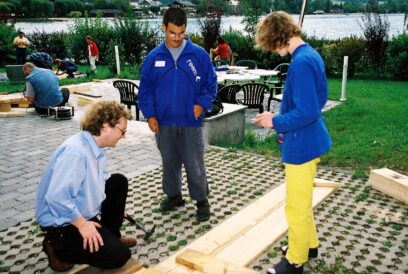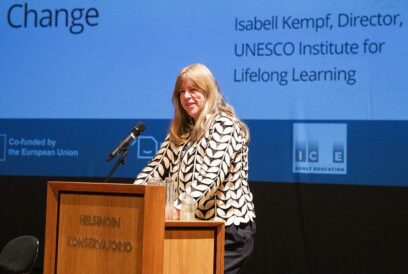

Ireland’s educational reforms have created a clearer path for adult education. Still, numbers of adult learners remain lower than in other EU countries. This is something that Ireland hopes to change in the near future.
Dublin-based 20-year-old Sarah O’Connell is interested in updating her skills in a part-time course to ensure better career opportunities in the future. She wants to look after disabled children after she has finished her degree in psychology. She is passionate about her studies and wants to improve her chances by taking on extra courses.
As a result, she has signed up for a basic sign language course run by the Deaf Society at Dublin’s Trinity College. She hopes that learning to sign will come in handy at some point.
“When I heard about these evening courses, I immediately became interested. For a long time, I’ve been wanting to learn to sign since it’s a skill that is not covered as part of my degree studies,” she says.
Sarah O’Connel is not alone. During the current academic year 167,100 adult learners in Ireland out of population of 2.5 million adults participated in lifelong learning, according to statistics from AONTAS, the Irish National Adult Learning Organisation.
Adult education was for years neglected in the Irish education system and was often seen as an afterthought or an unvalued activity.
But lifelong learning has not always been so popular in the country. Adult education was for years neglected in the Irish education system and was often seen as an afterthought or an unvalued activity.
In fact, during the “Celtic tiger years” of Irish economic boom, the mid-90s to late 2000s, adult education was not seen as vital to the country’s economic development but merely a part of a confusing system of numerous vocational educational committees that offered a wide range of different types of courses in the country.
The reforms set out a clear agenda
The roar of the Celtic tiger was subdued in 2008. A severe recession hit Ireland, the economy began to nose-dive, house prices plummeted, and unemployment was at a record high. People needed to become more employable.
It was time to re-think training and skilling people. As a result, in 2013, Ireland’s Further Education and Training Authority, SOLAS, was created.
“There was a perceived lack of coherence in the system. Several bodies providing similar training to similar learners, it became rather disjointed and there was a lot of duplication of courses,” said SOLAS research officer Nora Condon.
Our aim is to provide skills that support the economy so that people can take part in sustainable employment. It’s what we call active inclusion.
The agency is responsible for the integration, co-ordination and funding of a range of training and further education programmes around Ireland. The body itself does not provide any training but is an umbrella body in charge of the planning and funding.
Ireland also reformed its apprenticeship system and expanded it into new job sectors such as financial services, IT and hospitality. The existing apprenticeship system, which has traditionally been highly regarded in Ireland, was confined to a very limited number of sectors like construction. A target of 30,000 apprenticeships by 2020 has been set.
Today further education and training is provided to learners who have completed their initial schooling but have decided not to take part in higher education. This now includes adult literacy and basic education programmes, vocational training, and national apprenticeship programmes.
“Any learner aged 16 and over can be helped. Our aim is to provide skills that support the economy so that people can take part in sustainable employment. It’s what we call active inclusion. We aim to support people with all abilities in society,” says Condon.

No typical adult learners
Sarah O’Connell says her motivation for the evening course is clear. She wants to further her career opportunities by learning a new skill.
“I’m doing it for my CV. Competition for graduate jobs is tough, and anything that shows dedication to your chosen career might help,” she says.
O’Connell may sound like a typical lifelong learner but in fact there is no such thing as a typical adult student in Ireland.
Learners come from across the country and engage in adult learning for a host of reasons including upskilling for seeking employment or accessing new employment opportunities; as a parent to ensure that they are able to help their children with homework assignments; as a way to meet new people, as new immigrants to learn English in order to engage with people in their new home in Ireland.
Health and social services are an area that has a skills shortage in Ireland.
General learning courses, with a broader focus aiming to re-introduce people back to education are the most popular with some 75,000 people taking part in them, according to AONTAS research. Then come health, family and social service studies with near to 50,000 learners, while there are over 30,000 studying IT and 23,000 taking business and administration courses.
Health and social services are an area that has a skills shortage in Ireland, according to AONTAS.
Ireland still behind other EU countries
The renewed focus created challenges for learners, practitioners and providers who tried to find their place among the new and still settling bureaucratic structures.
In 2018, five years after the creation of SOLAS, Ireland is still lagging behind with the EU goal of 15 percent participation in lifelong learning by 2020. Ireland’s current lifelong learning participation rate is below 7 per cent and it has set its own goal of 10 percent participation by 2020.
Nevertheless, Ireland is hoping to follow the example of countries with high lifelong learning rates such as the UK, Luxembourg, France, the Netherlands, Finland and Sweden, which have all managed to break down many of the barriers to adult education.
The aim is to create incentives and make adult learning attractive, so that people can gain from doing extra training and become more employable.
Making lifelong learning part of the civic cultures of their countries and working to limit barriers to education among their populations have helped to stimulate participation among these populations.
A report ‘The Barriers to Further Education and Training report’ published by SOLAS in July 2017 clearly identified the obstacles adult learners faced. One of the main issue was students’ low confidence and poor or non-existent social supports necessary for participation.
Another was the lack of finances either because of costs for part-time education, or because of the necessity to leave employment to take part in scheduled education.
Lack of information on courses was also highly cited as a reason. Reaching out to non-traditional adult learners could help boost the numbers, the experts suggest.

Human capital a key asset to Ireland
Bringing learning to the same levels as other EU countries is something that Ireland hopes to achieve in the near future. Ireland has a very highly educated youth population and the best way to take advantage of it is to ensure their skills are updated, the experts noted.
“We need to boost our economy since human capital is our main natural resource. The best way to do this is to look at the labour market, identify skills shortages, and consider how best to plug the gaps,” says Condon.
This is when educating adults can help. As a result, lifelong learning plays a key role within SOLAS’ policies in order to raise awareness of the need to intervene in the workplace.
“The aim is to create incentives and make adult learning attractive, so that people can gain from doing extra training and become more employable,” Condon notes.
The wider benefits of adult learning include not only gaining qualifications and skills but also personal, social and cultural development. It is proven that life expectancy, well-being, and civic and political engagement increase with education. Ultimately it is about creating an opportunity for a better life.
“People deserve a second chance, and adult education plays an important role,” adds Condon.
Brexit poses challenge to Ireland’s skills training
The separation of Ireland’s main trading partner – the UK -from the EU creates potential challenges when it comes to skilling and learning.
A hard Brexit could involve UK leaving EU without a deal, which could in turn mean compromise on issues like the free movement of people as the UK begins trading with the EU as if it were any other country outside Europe.
Brexit could mean Ireland could lose jobs or gain jobs. Some companies could consider relocating to Dublin, which would mean increased demand.
There could be a need to skill the workforce for instance in financial services or service industries.
Author






